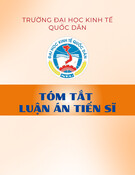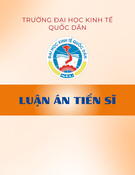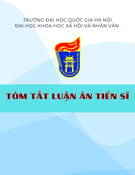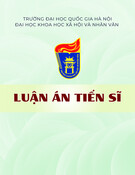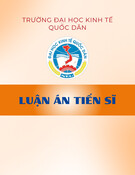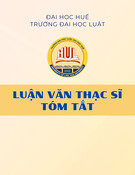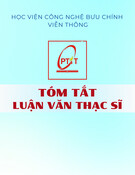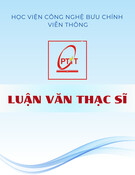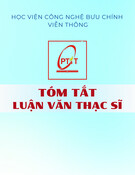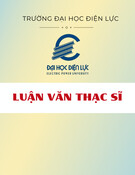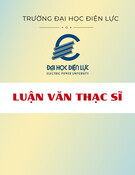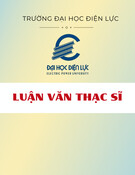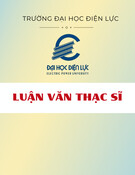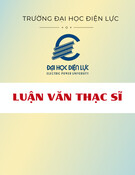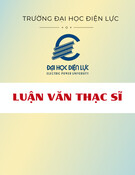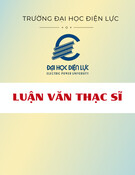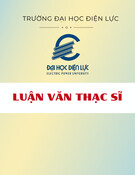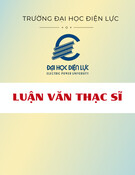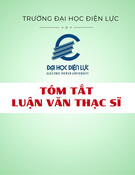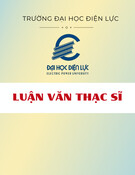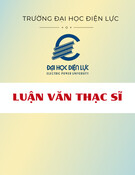
MINISTRY OF EDUATION AND TRAINING
THUONGMAI UNIVERSITY
------------------------------------
NGUYEN MINH TUAN
RESEARCH ON CUSTOMER LOYALTY
IN HANOI HOTEL INDUSTRY
MAJOR: Business administration
CODE: 934.01.01
Summary of doctoral thesis in economics

Hanoi, 2021

The work was completed at Thuongmai University
Supervisor:
Dr. Luc Thi Thu Huong
Dr. Nguyen Thi Tu
Reviewer 1:………………………………………………………………..
………………………………………………………………..
Reviewer 2:………………………………………………………………..
………………………………………………………………..
Reviewer 3:………………………………………………………………..
………………………………………………………………..
The thesis will be defended before School level thesis evaluation council meeting at
Thuongmai University.
At……. hour …… date ………. month………. year ………….
The thesis can be found at: National Library of Vietnam
Library of Thuongmai University

1
INTRODUCTION
1. Urgency of the topic
In terms of practice, the market for accommodation business in Vietnam is
increasingly competitive. In recent years, many large corporations in the hotel industry such
as Hilton, Intercontinental, Marriott, etc. continue to target the Hanoi market in particular
and Vietnam in general. At the same time, many famous domestic corporations such as FLC,
VinGroup, Mount Than also constantly upgrade and expand branches.
The entry of leading companies, along with the way of management, operation, and
professional service has created competition among enterprises in the hotel industry which
demand to change the operation method to improve service quality, increase their position,
attract customers, and build customer loyalty. On the other hand, scientific and technical
progress especially 4.0 technology, is applied in all fields, and the hotel is no exception.
Domestic or international tourists tend to search for hotels, prices, and services, etc. on the
internet for their trip before deciding which enterprise chose to provide their services. Social
networks, online travel agencies, and websites are all bridges between customers and the
hotel.
In the period from 2015 to 2019, along with the upward development of Vietnam's
hotel business, the number of tourist accommodation establishments in Hanoi increased
rapidly. In 2015, the number of accommodation establishments in Hanoi was 2,871
accounting for about 9%, and 45,769 rooms accounted for about 10% compared to the whole
country. In 2019, the total number of accommodation establishments in the city is 3,546,
increasing by 1.24 times compared to 2015. The number of accommodation establishments
in the area accounts for a high rate compared to the whole country reached 15.2%. Many 5-
star hotels have come into operation such as JW Marriott Hotel, Lotte Center, Grand Plaza,
InterContinental Westlake, etc. In addition, the demand, tastes, and quality requirements of
customers are getting higher with more choices. Many hotel projects in Hanoi that have been
built or are nearing completion have faced stiffer competition. At the same time, under the
impact of the Covid-19 pandemic, the Hanoi tourism industry in general and the hotel
service business, in particular, were seriously affected by the decrease in international and
domestic tourism demand.
From this reality, what do hotel managers need to do to satisfy customers, and at the

2
same time achieve sales, growth, and customer retention goals? There are many options to
answer the above question, but currently, most managers do not understand the real wants
and needs of customers. Therefore, to make tourists continue to use the products and
services at the hotel, the managers need to find out the factors that affect the customer's
loyalty. Building customer loyalty will create many benefits to the tourism industry in
general and the hotel business in particular. Specifically, customer loyalty makes an
important contribution to increasing the profitability of the hotels, and the cost of retaining
customers is much lower than the cost of finding new customers. With the loyalty of
customers, enterprises will obtain high profits and reduce marketing costs (Reichained and
Sasser, 1990).
Theoretically, customer loyalty in the hotel industry has been studied by many
domestic and foreign scientists. The empirical studies on customer loyalty in the hotel
system mainly focus on factors such as service quality, satisfaction, empathy, tangible
means, and service capacity (Rousan et al., 2010; Xiangyu and Jarinto, 2012; Kofi et al.,
2013; Galib, 2013; Saleem and Raja, 2014; Tefera and Govender, 2016). However, these
studies were all conducted in cities of developed countries where have many economic and
cultural differences compared to Hanoi, Vietnam. On the other hand, domestic studies on
customer loyalty in the hotel system in Ho Chi Minh and Vinh Long (Le Gia Bao et al.
2017; Nguyen Son Tung, 2019) are also different from the hotel system in Hanoi. The
research on hotels in Hanoi such as the study of Nguyen Van Huy and Pham Van Hanh
(2017) investigates the relationship between service quality, customer satisfaction, and
loyalty. The results indicate that service quality directly and positively affects customers
satisfaction. Moreover, the study shows that in 5 scales of service quality, assurance and
reliability play the most important role in influencing the quality of service provided by
Hanoi hotels.
All of the above analysis shows that customer loyalty in the Hanoi hotel industry has
not been studied popularly. Building and developing customer loyalty is very necessary for
the hotel business greatly affected by the Covid-19 pandemic. Therefore, the research on
customer loyalty in the Hanoi hotel industry is the topic, which meets the theoretical and
practical requirements of the hotel business in Hanoi.
2. Overview and research gaps
The studies on customer loyalty presented different views and definitions of customer

